Understanding how much do dachshunds weigh is crucial for maintaining their health and well-being. Knowing what factors influence their weight, the ideal weight ranges for different sizes, and how to manage their weight can help you ensure your dachshund leads a healthy, happy life.
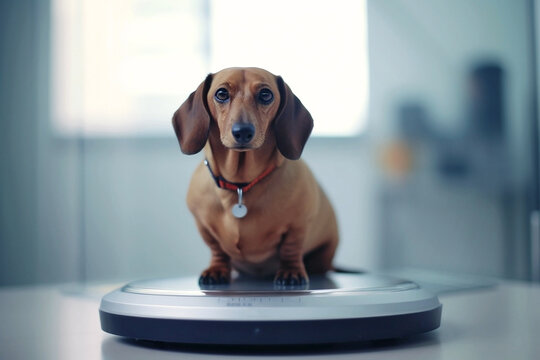
Factors Affecting Dachshund Weight
Several factors can influence the weight of a dachshund, making it important for owners to consider a holistic approach to their pet’s health. Below are some key elements to be aware of:
Genetics
Genetics play a significant role in determining a dachshund’s weight. Like humans, dachshunds inherit traits from their parents, including predispositions to certain body sizes and shapes. A dachshund with heavier parents may naturally tend to weigh more.

Diet
The type and amount of food that a dachshund consumes directly impact their weight. A balanced diet with appropriate portions is essential. Overfeeding or providing a diet high in fats and calories can lead to obesity, while underfeeding may result in a weight that is too low. Incorporating homemade dog food for dachshunds can help ensure they receive the right balance of nutrients and maintain a healthy weight.
Activity Level
A dachshund’s level of physical activity is another critical factor. How much exercise does a dachshund need? Regular exercise helps to maintain a healthy weight by burning calories and building muscle mass. Dachshunds that do not engage in enough physical activity may gain weight more easily compared to their more active counterparts.

Age
As dachshunds age, their metabolism can slow down, making them more prone to weight gain. Older dachshunds may also become less active due to joint issues or other health concerns, further exacerbating the tendency to gain weight.
Health Conditions
Certain medical conditions can influence a dachshund’s weight. Hypothyroidism, for example, can cause weight gain due to a slower metabolism. Conversely, conditions like diabetes or gastrointestinal problems can result in weight loss.
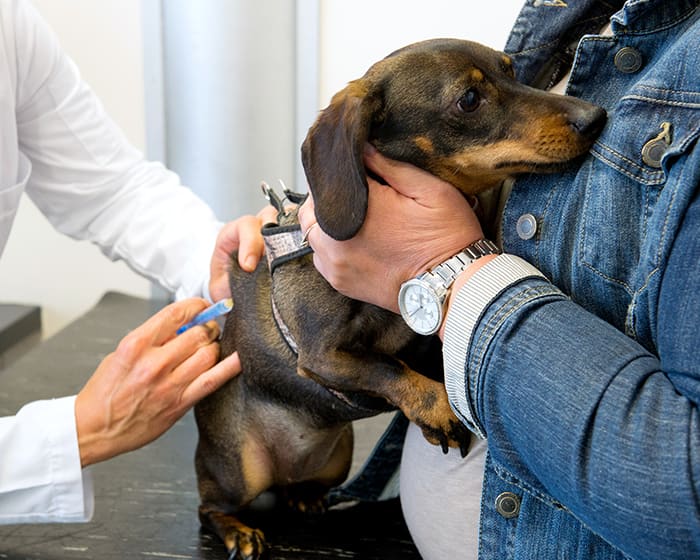
Spaying/Neutering
Spaying or neutering can also affect a dachshund’s weight. These procedures typically slow down a pet’s metabolism, which can lead to weight gain if their diet and exercise routine are not adjusted accordingly.
Understanding these factors can help you better manage your dachshund’s weight and overall health. By considering genetics, diet, activity level, age, health conditions, and the impact of spaying or neutering, you can take proactive steps to ensure your dachshund maintains an ideal weight throughout their life.
How much do dachshunds weigh ?
Dachshund Dog Weight Chart
| Age | Miniature Dachshund (pounds) | Standard Dachshund (pounds) |
|---|---|---|
| 2 months | 1.5 – 3.5 | 3 – 5 |
| 3 months | 3 – 6 | 5 – 7 |
| 4 months | 4 – 8 | 6 – 9 |
| 5 months | 5 – 9 | 7 – 11 |
| 6 months | 6 – 10 | 8 – 13 |
| 7 months | 7 – 11 | 9 – 14 |
| 8 months | 8 – 12 | 10 – 16 |
| 9 months | 8 – 13 | 11 – 17 |
| 10 months | 9 – 14 | 12 – 18 |
| 12 months | 10 – 15 | 14 – 21 |
| Adult | 8 – 11 | 16 – 32 |
These weights are averages and can vary depending on individual dogs. Keeping your dog’s weight within the ideal range helps maintain their health and development.
Average Weight of Dachshund Dogs
Most miniature dachshunds weigh between 8 to 11 pounds, while standard dachshunds typically weigh between 16 to 32 pounds. Understanding these weight ranges can help you gauge whether your dachshund is within a healthy weight range.

Effect of Size (Miniature, Standard) on Weight
The size of your dachshund significantly impacts its weight. Miniature dachshunds are smaller and lighter than standard dachshunds. It’s important to adjust food portions and exercise routines according to their size to maintain a healthy weight.
Health Risks Associated with Overweight Dachshunds
To determine if your Dachshund is overweight, you can use the following methods:
- Visual and tactile assessment: Observe if your dog appears heavier than usual. Look down at your dog from above and see if you can notice a defined waistline. Feeling your dog’s body, you might notice excess fat or folds, especially around the back and shoulders.
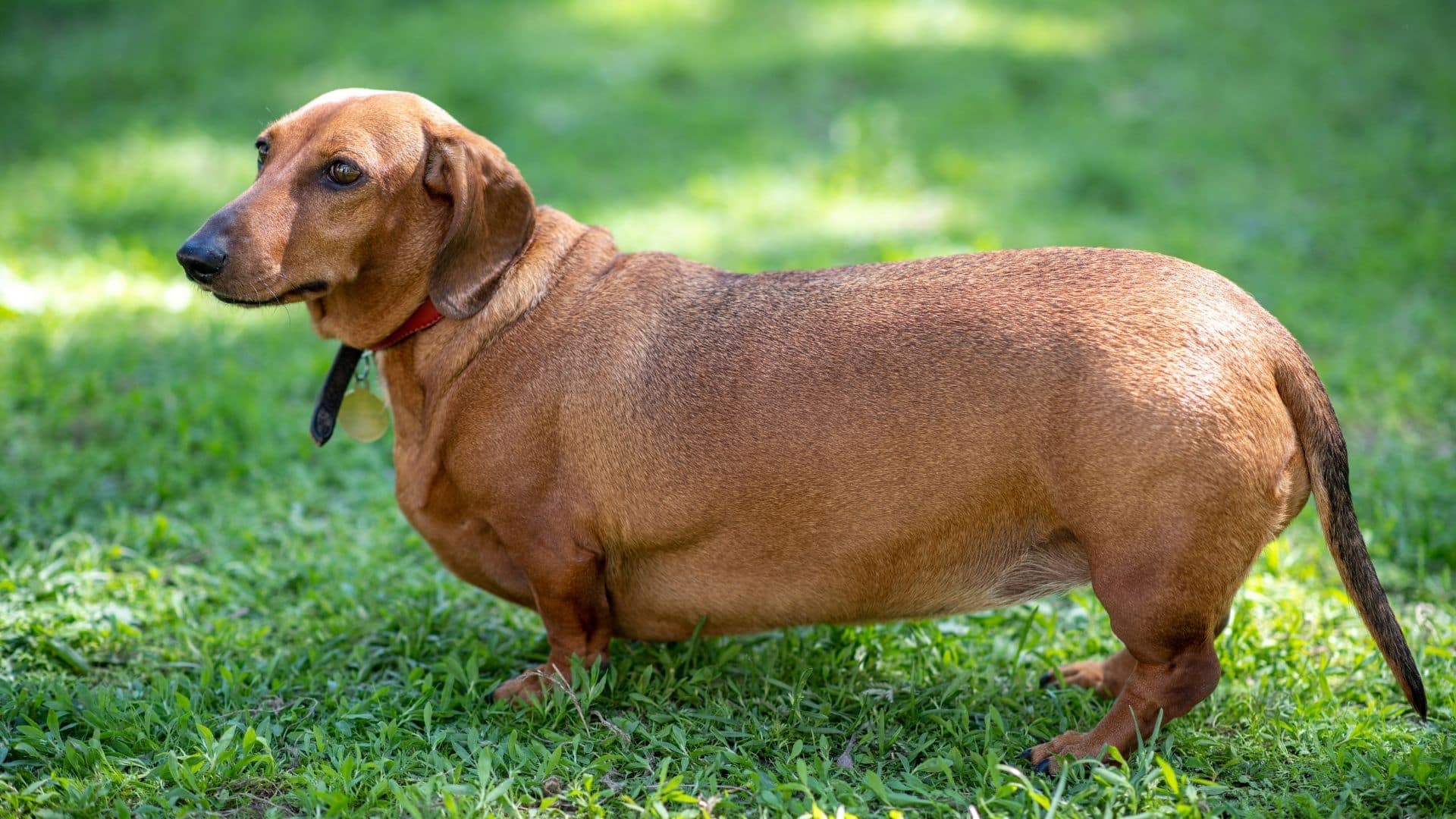
Health Risks Associated with Overweight Dachshunds - Feel for fat deposits: When you touch your dog’s back and sides, if you feel a thick layer of fat or noticeable folds, it could indicate overweight.
- Compare with weight charts: Compare your dog’s current weight with average weight charts for Dachshunds. If your dog exceeds the recommended weight range, it may indicate overweight.
- Measure the waistline: Measure your dog’s waistline. If it is larger than normal or not well-defined, it may be a sign of excess weight.
- Monitor changes: Keep an eye on your dog’s weight over time. Rapid weight gain or decreased activity levels can also be signs of overweight.
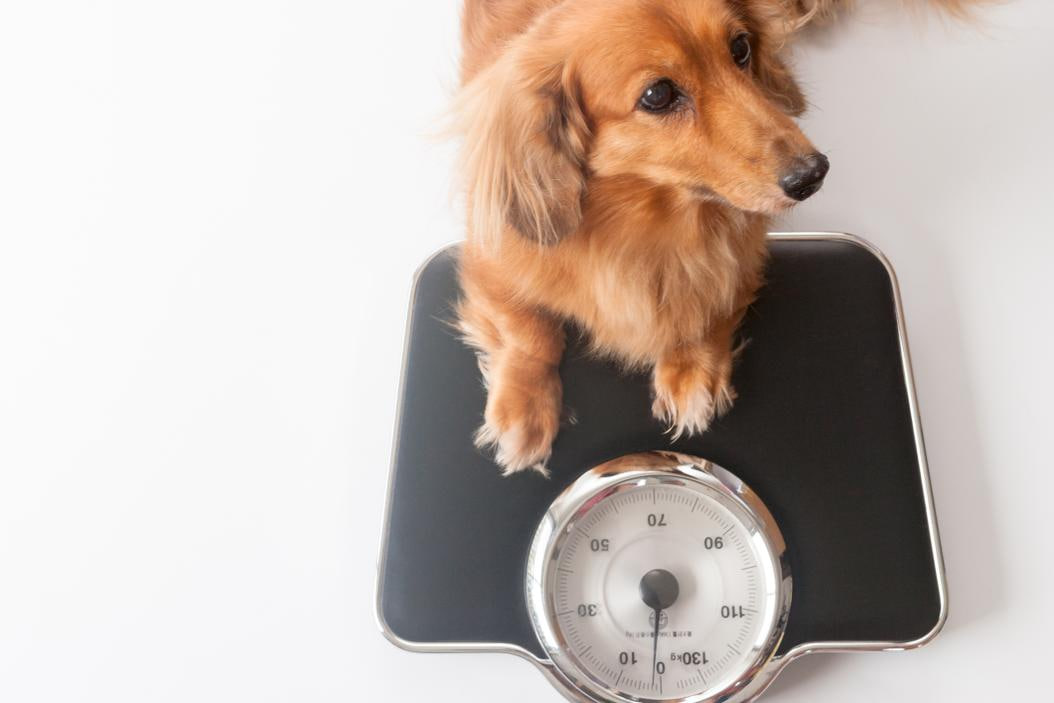
Health Risks Associated with Overweight Dachshunds
If you suspect your Dachshund is overweight, consult your veterinarian for an assessment. They can evaluate your dog’s overall health and provide specific advice on nutrition and appropriate exercise to help manage weight if needed.
What Health Problems Can Obesity Lead To?
Obesity in dachshunds can lead to a multitude of serious health problems that impact both their longevity and quality of life. Here are some of the primary health concerns associated with obesity in dachshunds:
Joint and Bone Issues
Excess weight puts additional strain on your dachshund’s joints and bones, which can lead to conditions such as:
- Arthritis: The extra weight accelerates the wear and tear on the cartilage in your dog’s joints, leading to painful inflammation and stiffness.
- Hip Dysplasia: Although more common in larger breeds, overweight dachshunds can also suffer from hip dysplasia, resulting in pain and decreased mobility.
- Intervertebral Disc Disease (IVDD): Dachshunds are already predisposed to IVDD due to their elongated spines. Carrying extra weight increases the risk of disc herniation and spinal problems, which can lead to severe pain and even paralysis.
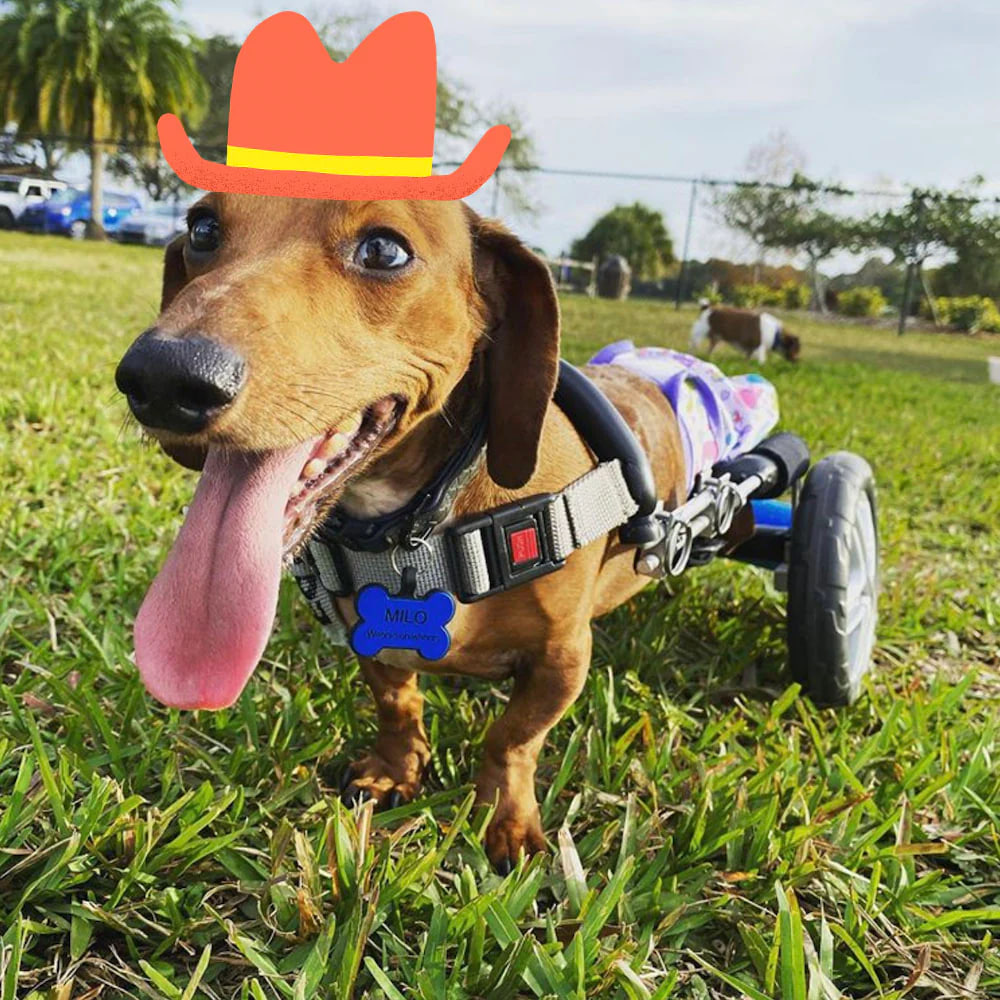
Joint and Bone Issues
Cardiovascular Problems
Carrying extra pounds places additional stress on your dachshund’s heart, contributing to:
- Heart Disease: Obesity can lead to conditions such as congestive heart failure, where the heart becomes less efficient at pumping blood, leading to fluid buildup and reduced oxygen supply to organs and tissues.

Cardiovascular Problems
- Hypertension: Overweight dogs are more likely to develop high blood pressure, which can cause further complications like kidney damage or stroke.
Metabolic Disorders
Obesity significantly increases the risk of metabolic conditions, including:
- Diabetes Mellitus: Excess body fat can cause insulin resistance, leading to diabetes. Managing diabetes in dogs often requires strict dietary control, weight management, and potentially life-long insulin injections.
- Hyperlipidemia: This condition, characterized by elevated levels of fat in the blood, can lead to pancreatitis and other health issues.
Respiratory Complications
Extra weight can make breathing more difficult for your dachshund, contributing to:
- Brachycephalic Syndrome: While typically associated with breeds like pugs, overweight dachshunds can also exhibit symptoms like labored breathing and snoring.
- Exercise Intolerance: Difficulty breathing can make physical activity more strenuous, worsened by the added weight, leading to a sedate lifestyle that further exacerbates obesity.
Digestive and Liver Issues
Obesity can impact your dachshund’s digestive system in several ways:
- Pancreatitis: Overweight dogs are at a higher risk of developing pancreatitis, a painful and potentially life-threatening inflammation of the pancreas triggered by a high-fat diet.
- Hepatic Lipidosis: Fat deposits can accumulate in the liver, leading to a condition known as liver disease, which impairs liver function and overall health.
Reduced Immune Function
Obesity can weaken your dog’s immune system, making them more susceptible to infections, illnesses, and slower recovery from surgeries or injuries.
Reduced Lifespan
Overall, dachshunds that are overweight or obese have a shorter life expectancy due to the combination of these health issues. The chronic strain on their metabolic and organ systems accelerates aging and increases the risk of earlier mortality.
By effectively managing your dachshund’s weight through a balanced diet, regular exercise, and ongoing veterinary care, you can mitigate these health risks and help ensure they live a happier, longer, and healthier life.

How to Maintain a Healthy Weight for Dachshund Dogs
Appropriate nutrition
- Choose Best Dog Food for Dachshunds that is suitable for their age, weight, and activity level.
- Divide their daily food intake into several small meals to reduce the risk of obesity.
- Avoid overfeeding with high-fat and high-carbohydrate foods.

Appropriate nutrition
Monitor portion sizes
- If your dog is overweight, consult your veterinarian for a tailored weight loss diet plan.
- Consider using low-calorie or weight management dog food.
Provide adequate exercise
- Ensure your dog gets enough daily exercise to maintain a healthy weight and overall fitness.
- Take your dog for walks, play games like fetch, or engage in other active play to encourage movement.

Provide adequate exercise
Monitor weight and body condition
- Regularly monitor your dog’s weight and adjust their diet and exercise regimen as needed.
- Check their body condition to ensure they maintain an ideal body shape.

Monitor weight and body condition
Focus on overall health
- Ensure your dog receives a balanced and nutritious diet.
- Schedule regular veterinary check-ups and seek advice on nutrition and weight management.
By combining proper nutrition, sufficient exercise, and vigilant monitoring, you can help your Dachshund maintain a healthy weight and overall well-being.
Summary
In conclusion, understanding how much do dachshunds weigh is crucial for their health and well-being. Whether you have a standard, miniature, or tweenie Dachshund, monitoring their weight and ensuring they maintain a healthy range is essential. By providing appropriate nutrition, regular exercise, and veterinary care, you can help your Dachshund live a happy and healthy life. Remember, how much Dachshunds weigh can vary based on factors like breed type and individual characteristics, so staying informed and proactive in their care is key to their overall health.

Cuddle Companions is your go-to resource for everything you need to keep your furry friends happy and healthy. We specialize in providing detailed and helpful information about the best foods, treats, and care practices for pets of all kinds. Whether you’re a seasoned pet owner or a new puppy parent, our team of experienced and passionate experts is dedicated to offering reliable advice and recommendations. At Cuddle Companions, we believe that a well-cared-for pet is a happy pet, and we’re here to help you every step of the way. Visit us at [bestdogfoodfordachshunds.net] for more information and resources.

